
Do you think SMS has become outdated in the era of social media and apps? Think again. With an open rate of 98%, almost five times higher than email, SMS is still a powerful tool for reaching customers instantly. But how do businesses manage to send millions of texts within seconds? That’s where an enterprise SMS gateway comes into play.
An enterprise SMS gateway is a simple, robust, and automated solution that helps businesses leverage the power of SMS communication. This post will discuss the role of enterprise SMS gateways in enterprise messaging, a technical view of their workings, real-life scenarios where gateways play their part, and best practices to follow when using them. You’ll also learn about our REVE SMS gateway platform, which is an enterprise-grade solution for wholesale and retail SMS trading.
So, let’s get started!
What is Enterprise SMS?
Enterprise SMS refers to the use of Short Message Service (SMS) by companies/ organizations, typically in high volumes, to facilitate direct and immediate communication with customers and automate bulk messaging at scale.
Some of the most common scenarios where enterprise SMS is used are marketing campaigns, emergency notifications, customer feedback and surveys, and event promotions.
What is Enterprise SMS Gateway?
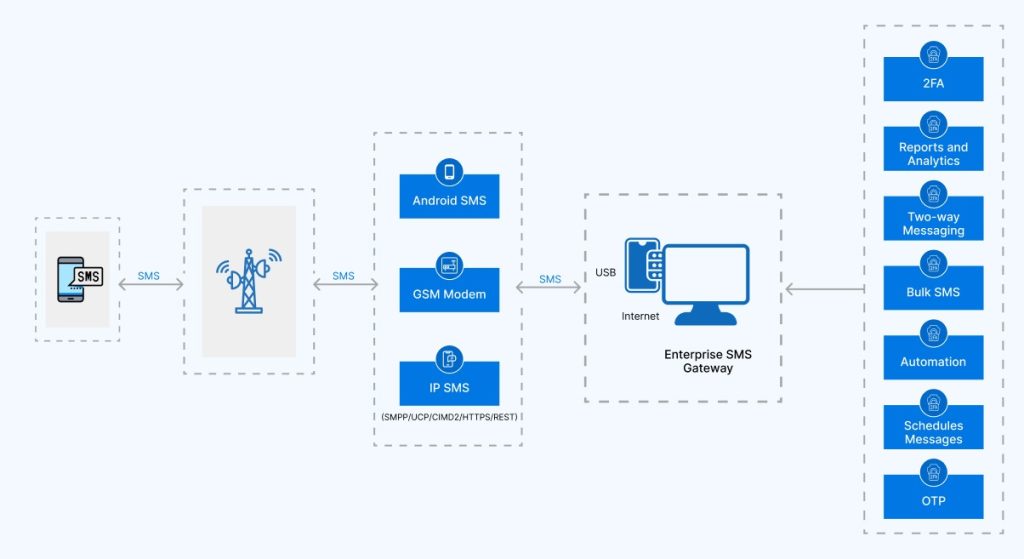
Unlike consumer-grade SMS systems, enterprise-grade SMS gateway solutions are specifically designed to meet the communication demands of large organizations. In other words, using an enterprise SMS gateway, businesses can integrate the SMS functionality into their existing applications and workflows and can send and receive SMS messages in bulk volumes.
How Does an Enterprise SMS Gateway Work?
To understand the working of an enterprise SMS gateway, simply consider it as a bridge between your business systems and the mobile networks around the world. Here’s how the process happens:
How do Enterprise SMS Gateways process Outbound Messages?
- Message Origination/ Creation
The business creates an SMS message using a business application such as a CRM. This application then connects with the SMS gateway using an API. The API connection is usually created using:
- SMPP i.e. Short Message Peer-to-Peer protocol: It is an advanced, high-performance protocol that works best for large-volume or bulk messages.
- HTTP/REST: These APIs are also widely used because of their simpler implementation and are typically suitable for lower message volumes.
- Message Processing at Gateway
Once the connection gets established, the SMS gateway receives the SMS-relevant information such as the content of the SMS, phone numbers of the recipients, etc., from the business application. It then begins formatting this information into a standard version that is compatible with telecom networks.
- Message Delivery
Then the SMS gateway determines the appropriate MNOs or telecom operators and connects with them so as to route the messages based on the recipient’s phone numbers. It then sends the formatted SMS messages to the SMSC of the MNO, which then delivers the message to the recipient’s or end users’ mobile devices.
In essence, we can say that an enterprise SMS gateway performs various tasks for the successful delivery of SMS messages. From the translation of the message to an understandable format, routing it to the appropriate operator, managing the delivery, and reporting, the role of gateway spans throughout the SMS process.
Use Case of SMS Gateway in Enterprise Environment
Instant communication is no longer a luxury in today’s mobile-first world, it’s a necessity. This is the main reason why businesses need to adopt enterprise SMS gateways to accomplish their instant communication goals. But how? Businesses from different industries are using these gateways, some of the key ones are as mentioned-below:
Marketing Campaigns

Every business wants to sell more products or services. A marketing campaign is a plan to get more people to buy its products or services. The most common area where businesses use SMS gateways is for sending promotional offers, discounts, and announcements to a large group of audience. Sending these campaigns helps businesses drive customer engagement.
Customer Support
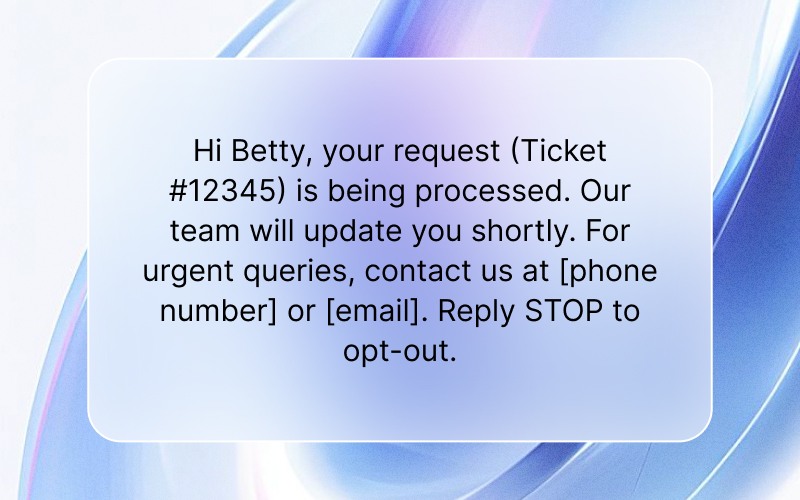
Often, customers need help with the products and services purchased from a business. To solve their issues, they need someone from the business side to assist them. This is customer support.
This is another key area where businesses leverage the power of SMS gateways to connect with customers directly on their mobile devices. By sending SMS messages, businesses can provide customers with updates on support tickets, sending appointment reminders, etc.
Internal Communication
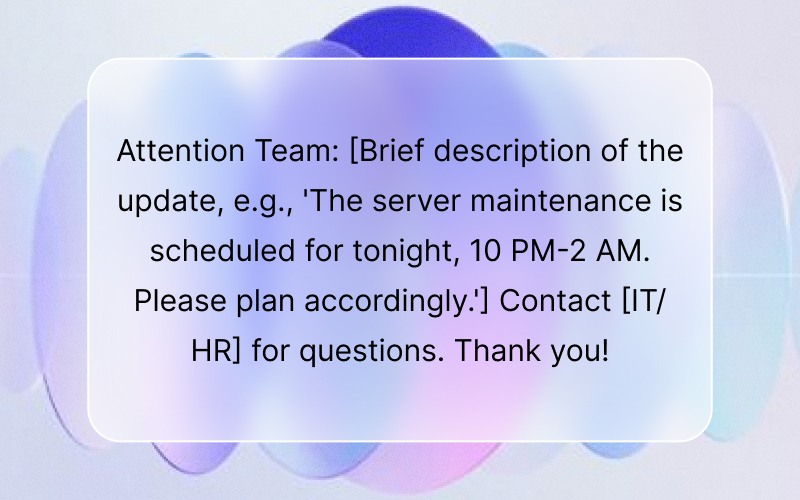
Besides customers, enterprises must also communicate with employees to share alerts, notifications, and emergency messages. Companies worldwide use SMS for their internal communication needs, as most of the time, communication needs to be done promptly, and SMS is just the ideal tool for this.
2 Factor Authentication
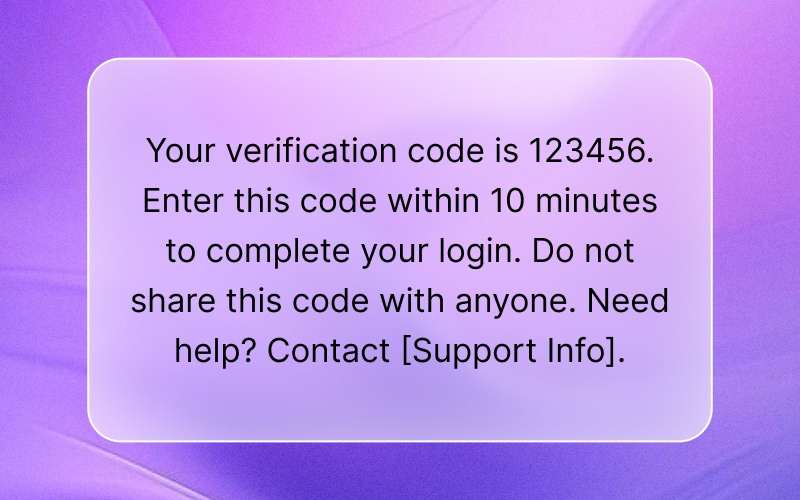
Privacy and data security are a paramount concern in today’s digital world. An increasing number of companies are now using 2 Factor Authentication or 2 FA, which acts as an additional layer of security for user logins. The process works like this:
- A user enters his username and password to access his online account
- The system generates an OTP, or One-Time Password, which is sent to the user’s registered mobile number via SMS. The OTP is typically sent once and is valid for a few minutes only.
- Upon entering the OTP on the user login screen, the access is granted
This is an effective way to prevent unauthorized access and hacking attempts.
Appointment Reminders
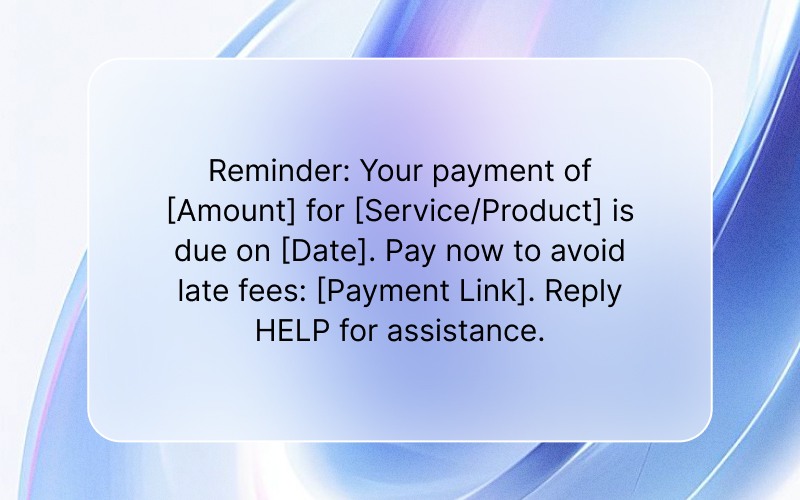
Many businesses such as healthcare clinics, real estate agents, online retailers, etc., need to send operational notifications to their customers. These can be in the form of appointment reminders, order status, and booking information. In such scenarios, automated text messages can be real saviors.
Apart from the above mentioned, there are numerous ways in which SMS gateways are used by enterprises for SMS communication.
Features of an Enterprise Messaging Gateway
Enterprise SMS gateways go beyond basic text messaging and provide a robust set of features and functionalities, that make them a must-have for modern enterprises. Let’s explore the features of enterprise SMS gateways in detail:
Supports High-volume or Bulk Messaging
As mentioned, enterprise SMS gateways offer high scalability, i.e., they are designed to handle large volumes of text messages simultaneously. So, when a business wants to send text-based mass notifications or run a marketing campaign for a newly launched product, it can easily rely on enterprise SMS gateways.
SMS Integration with Existing Systems
Enterprise SMS gateways come with integration capabilities via APIs or Application Programming Interfaces like HTTP, REST, or SMPP). This means that businesses can seamlessly integrate the SMS functionality into their existing systems and applications such as CRM, ERP, etc. This feature is quite useful to enable automated messaging based on specific triggers or events.
Supports two-way SMS Communication
While sending SMS messages to customers is important, businesses also need to be able to receive text messages to interact with them. Enterprise SMS gateways support two-way messaging, enabling businesses to receive and process incoming messages. This functionality is useful in scenarios such as gathering customer feedback via text messages.
Provides Security and Compliance
Enterprise SMS gateway solutions implement the latest and robust security mechanisms such as end-to-end encryption to provide secure transmission of SMS messages. Additionally, these systems adhere to relevant data privacy regulations such as GDPR and CCPA maintaining compliance.
Offers Insights with Reporting and Analytics
Modern enterprise SMS gateways are packed with advanced reporting and analytics features. With these features, businesses can monitor, track, and analyze various aspects related to messages such as the delivery status of the messages, track message success rates, and performance of the SMS campaigns.
Predefined SMS Templates and Customization
Enterprise SMS gateway solutions can make sending bulk messages easier by providing predefined SMS templates. Businesses can create and save standard message templates that they can use in other SMS campaigns. They can tweak these templates with dynamic variables to send different SMS campaigns, saving much of their time and effort.
How REVE SMS Gateway Empowers Enterprise Communication?
REVE SMS Gateway is an enterprise-grade SMS gateway designed specifically for wholesale carriers, SMS aggregators, MNOs, and MVNOs. You can conduct your SMS business with complete ease and reliability through our platform.
REVE SMS platform facilitates several key features that make it a profitable solution for wholesale and retail SMS trading. Let’s take a look at some of its highlights:
- Available in licensed and hosted version
- Facilitates various types of messaging, including A2P, P2P, and P2A
- Carrier-Grade Scalability
- Real-Time Billing and Reporting
- Seamless API Integration
- Intelligent routing mechanisms
REVE SMS Gateway stands out for its high performance, extensive features, and user-friendly interface. With its global reach, robust scalability, and real-time capabilities, it is an ideal choice for businesses and telecom operators aiming to optimize their messaging operations.
Enterprise SMS Gateway Best Practices
Enterprise text messaging is a lot more than just sending simple texts. One mistake can impact the performance of your campaigns or can even make you land in legal trouble. Therefore, when using an enterprise SMS gateway, make sure to follow these best practices:
Avoid Spam Like Behavior

If you are sending irrelevant and poorly timed messages to your customers, then it will certainly irritate them and harm your reputation. It is always a good idea to:
- Categorize your audience based on geography, preferences, and interests.
- Personalize messages based on the available customer data.
- Schedule messages according to the customers’ time zones. Try to avoid sending messages during early mornings and late nights.
Adhere to Messaging Laws
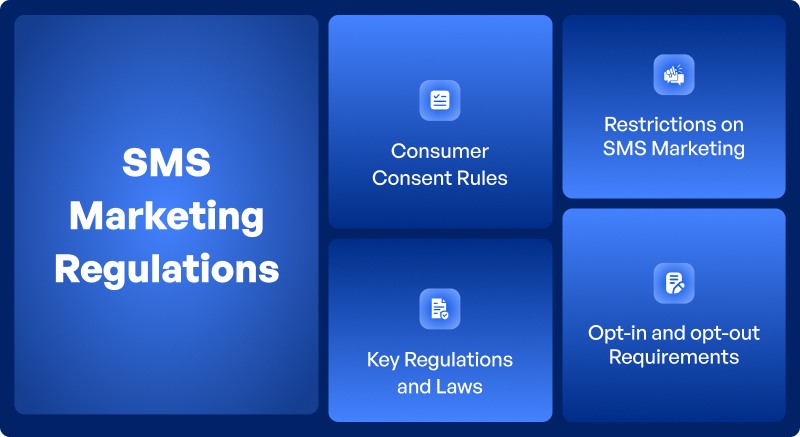
- Obtain Explicit Consent from Your Customers
This one is mandatory. Before you send SMS messages to your audience, make sure to get clear permission from them. You can take the help of web forms and SMS short codes to get their consent.
- Provide Direct and Easy Opt-Out
If a user no longer requires to receive messages from your business, then he should be able to unsubscribe without any hassle. To honor opt-out requests, you must provide them with clear instructions on how to unsubscribe in every message. A simple example is: Reply STOP to unsubscribe.
- Comply with Regulations
The first step to ensure compliance is to familiarize yourself with relevant regulations such as GDPR, TCPA, and DND policies for your target regions. Understand and implement necessary policies to ensure that you don’t face any legal repercussions.
- Keep a Record of Everything
Maintaining records of consent, opt-out requests, and message logs can be a lot helpful for compliance and auditing purposes.
Keep your Content Optimized
- Make sure your messages follow the standard 160-character limit. Use clear and concise language. To save characters, you may consider using shortened URLs.
- Clearly state your identity. You can use an alphanumeric sender ID so that it reflects who you are.
- If your message requires recipients to take action, make sure to provide them with a clear Call to Action. A simple example is to visit our website.
- Also, avoid sending too many messages to the same audience regularly.
Keep an Eye on Your Delivery Rates
It is important to ensure that your messages reach the intended recipients reliably. Track the status of your messages using delivery recipients. Make sure to keep a clean customer database by updating your contact lists regularly to remove invalid numbers.
Scale with APIs and Automation
Using appropriate APIs can help you handle high-volume messaging efficiently. Integrate your existing business applications and systems such as CRM, and ERP with the SMS gateway. Routine messages such as reminders, order updates, etc., should be automated.
Choose a Reliable Gateway Provider
A reliable SMS gateway provider can simplify many things for you. So make sure you evaluate providers based on global coverage, uptime, and scalability. It is better to test the provider’s services by taking a demo or trial.
Conclusion
We have learned that SMS gateways play a critical role in enterprise SMS communication. Businesses should choose a reliable platform and follow best practices to align it with their communication goals. Interested in a free demo of our robust and reliable enterprise SMS gateway? We will be happy to assist you!
Frequently Asked Questions
What is an SMS API?
An SMS API i.e. Application Programming Interface, is a software interface that allows applications to send and receive SMS messages programmatically. It enables businesses to integrate messaging functionality into their own systems, such as CRMs, ERPs, or mobile apps. SMS APIs are commonly used for sending OTPs, notifications, and marketing messages.
What is the character limit for an SMS?
The character limit for a standard SMS is 160 characters, however, if including special characters, then the limit reduces to 70 characters per message. If in case the message content exceeds the character limit, the message is sent as concatenated SMS i.e. it is split into segments.
What is A2P SMS?
A2P stands for Application-to-Person. Therefore A2P SMS refers to the text messages sent from a business application to an end user. A simple example of an A2P SMS is that of a booking confirmation message received. Robust SMS platforms like REVE SMS support A2P messaging for automated and bulk SMS communication.
Can REVE SMS Platform handle the high volume of SMS messages?
Yes, REVE SMS is a telco-grade platform to handle high-volume SMS traffic seamlessly. With its powerful feature set, it ensures scalability, reliability, and minimal latency.
Is REVE SMS suitable for small or large businesses?
REVE SMS is a versatile SMS platform suitable for both small and large businesses. Its user-friendly interface and powerful features like real-time billing benefit small companies. Additionally, it’s scalability, support for bulk messaging and several other advanced features fulfill the needs of large businesses as well.




























